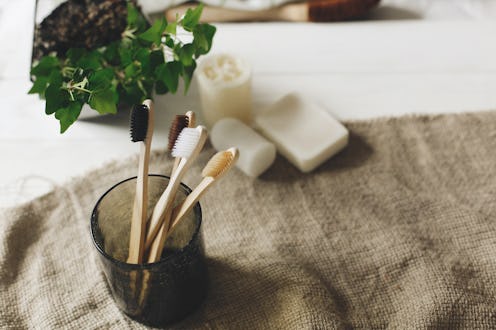(Living)
Why This Is A Great Time To Start Living More Sustainably — If You Haven't Already

In the midst of a global pandemic, with much of the world shutting down, it's hard to feel hopeful. But one way in which this ongoing challenge can be seen to have a silver lining is by using your time at home to live more sustainably. Implementing a few lifestyle changes around the house (or apartment), will not only help pass the time, but also keep you focused on the fact that this state is temporary and that we have a future worth investing in. Why not combat homebound induced boredom by tackling those projects you've dismissed as too time consuming? (Netflix will still be there when you're done.)
The sky is the limit, but since it's generally advisable to start small, particularly when the lure of the snack cupboard is strong, we tapped a few experts to share their best entry-level tips. The first being author and sustainable small space living consultant, Whitney Leigh Morris, who lives and creates content from her tiny cottage on the Venice canals in Los Angeles. The second is Haley Boyd, sustainably minded founder of footwear line Marais who is currently working on launching a new sourcing tool for the fashion industry. The insights, and indeed each of their digital personas, are a fantastic blend of informative and non-judgmental. Here, a few takeaways to focus your attention on now.
Sustainability Tips For The Home: Practice Cooking From Scratch
With the extra time at home, why not brush up on a few from-scratch recipes you can add to your arsenal? "You'll save money and eat healthy, delicious food," says Boyd, with the added bonus of minimizing wasteful packaging that is common in pre-packaged foods. "Use simple, whole ingredients like dry beans and grains, and have fun with it," says Boyd who even learned to bake bread this week. "Pickling vegetables is another easy, cost effective and delicious option."
Sustainability Tips For The Home: Repurpose Old Fabrics
Especially in a time of increased paper towel usage and waste, why not opt to use reusable materials instead? "You can easily make washable cloth goods yourself out of old cotton cloths and sheets," explains Morris. Put those old t-shirts and any bleached or bedraggled towels to good use here. "It helps to select varying colors and/or patterns so you can manage both clean and dirty laundry with ease."
Sustainability Tips For The Home: Educate Yourself
If you're alternating between the frequently updated headlines and even more frequently updated meme accounts, consider breaking things up with some climate change literature. Now is a great time to educate yourself about the most pressing aspects of the crisis, as well as how your lifestyle and choices contribute to the problem. If you're going to make a change, you should research how, why and where you think your efforts will be most impactful.
"We no longer have the time to delay modifying our lifestyles due to feelings of helplessness, or cluelessness on where to start," says Morris, who advises starting with the book The Future We Choose: Surviving the Climate Crisis, written by Christiana Figueres and Tom Rivett-Carnac, the lead negotiators for the United Nations during the Paris Agreement. "Bonus points for ordering an e-reader version of the book over a printed version that uses resources from production, packing, and shipping."
Sustainability Tips For The Home: Focus Attention On Your Vanity
A lot of packaging and landfill waste is generated by bathroom products, via everything from washing supplies to toothpaste. So if there is one area of your home to overhaul, make it the bathroom. Obviously you have to wait for your products to run out, but start phasing out plastic bottled shampoos and conditioners in favor of bars. "There are now a variety of options for shaving, shampoo and conditioner, too," points out Morris. "As someone with long, thick hair, I can say that they do indeed work just as well as their wasteful counterparts."
Sustainability Tips For The Home: Make A Habit Of Your New Lifestyle
Yes, it has taken a worldwide health crisis for this to happen, but we're all consuming fewer material goods because they aren't being produced or distributed with the ease they previously were. "I hope we will discover that we are happier with less, or at least, that buying things doesn't make us happy," says Boyd. Taking note and being conscious of this shift is a great way to cleanse ourselves from our consumerist mindset, and make this practice of reduced consumption into more of a habit. "When you do need something, put thought into how it was made, and who you are supporting with your purchase," suggest Boyd. It's a sentiment that resonates thoroughly now, but will continue to be crucial as we move forward.